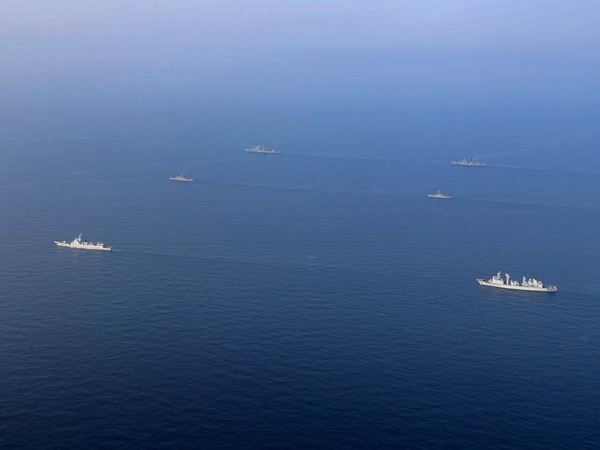
Japan in its strategy of increasing military aid
Nov 25, 2023
Tokyo [Japan], November 25: Japan is expanding its official security assistance (OSA) program to a number of countries, including Southeast Asian countries, to strengthen security capabilities to cope with emerging challenges.
The Defense Post reported on November 23 that Japan will provide patrol boats worth about 3.8 million USD to Bangladesh. This provision is part of the OSA program that Japan has for Bangladesh. Recently, while on an official visit to the Philippines, Japanese Prime Minister Fumio Kishida also announced OSA for the host country, specifically maritime reconnaissance radar aid.
Strengthening the capacity of "like-minded countries"
In April 2023, Japan announced OSA as an important part of its new security strategy. In the announcement about OSA, Tokyo emphasized: "When Japan is in the midst of the most serious and complex security environment since the end of World War 2, it is necessary for Japan to strongly strengthen its defense capabilities. national defense, as well as strengthening the security and deterrence capacity of like-minded countries. To prevent unilateral attempts to change the status quo by force, ensuring peace and stability of the region Indo-Pacific region and create a desirable security environment for Japan".
For that reason, Japan announced the establishment of an OSA framework to provide supplies, equipment as well as support infrastructure development based on the security needs of countries.
Even in fiscal year 2023, Japan set aside a budget of 2 billion yen (nearly 14 million USD) to implement OSA for the Philippines, Bangladesh, Fiji and Malaysia. It is expected that in fiscal year 2024, Japan will increase the OSA budget to 5 billion yen (about 34 million USD) for 6 countries, including 3 Southeast Asian countries.
Focus on maritime
Responding to ThanhNien on November 24, Associate Professor Kei Koga (Global Affairs and Public Policy Program - School of Social Sciences - Nanyang Technological University, Singapore) pointed out that the idea of establishing OSA came from the Security Strategy . Japan's new national security policy , issued in 2022, aims to maintain and strengthen a "free and open international order" based on the rule of law.
"Therefore, this OSA is a kind of balance of power "offshore" for Japan as Tokyo tries to maintain the status quo without directly creating a military alliance with like-minded countries," Associate Professor Koga further analyzed and evaluated: "Saying that does not mean that Japan can provide any military equipment to them. Japan needs to follow the principles of transferring defense equipment and technology of the country. Japan also considers economic and social conditions, such as democratic participation and protection of human rights, and the process must be transparent. So, most likely, defense equipment This mission is aimed at monitoring and surveillance in territorial waters and airspace, anti-terrorism, and anti-piracy .
"In particular, improving maritime domain awareness is important for countries in the region to protect their maritime territories in both traditional and non-traditional security issues. tradition", Mr. Koga commented and also said that OSA will help "like-minded" countries with Japan strengthen their defense capabilities.
Deal with challenges
Also responding to ThanhNien , Professor Yoichiro Sato (international relations expert, Ritsumeikan Asia-Pacific University, Japan; senior scholar of the YusofIshak Institute of Southeast Asian Studies, Singapore) analyzed: "Japan faces many limitations in dealing with growing security challenges in the Indo-Pacific, so Prime Minister Kishida's administration announced a doubling of spending on security, ending the 4 decade of compliance with a defense spending ceiling of 1% of GDP".
According to Mr. Sato, the Japanese government's efforts to increase the security budget could increase tax revenue, so it will not be supported by the people. Furthermore, Japan's Self-Defense Forces face severe limitations in recruiting personnel due to a shrinking youth population. Meanwhile, Japan has barely kept up with the growing risk levels in its neighborhood. Not only that, Japan also faces the need to balance emerging challenges and other security threats, especially along important maritime routes.
To address these challenges, Professor Sato believes that it is important for Japan to do the following: Strengthen the capacity of Asian coastal countries to ensure security for maritime areas; Maintain close partnerships to allow Japanese SDF forces access to operating bases in remote areas; Strengthen the ability to operate jointly with like-minded Asian countries in contingencies; Building a network of security partnerships, with the core of the US-Japan alliance; Diversify defense supplies so that Asian countries limit their dependence on some of Japan's opponents; Create foreign markets for Japanese-made defense equipment.
"OSA was established to promote Japan's security diplomacy towards these goals," Professor Sato analyzed.
Source: ThanhNien Newspaper









